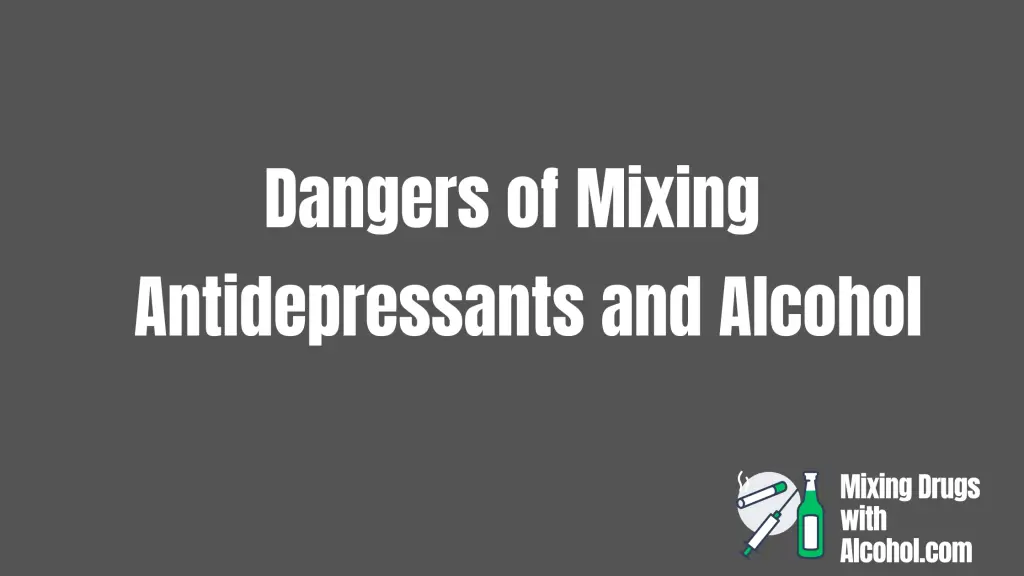Mixing antidepressants and alcohol can be dangerous, and many people are unaware of the associated risks. This combination may lead to serious side effects that can harm your health. It’s crucial to know the potential risks before deciding whether or not to drink while taking an antidepressant.
How Long After Taking Antidepressants Can You Drink?
Antidepressants and alcohol can be a dangerous combination. Both affect similar pathways in the body, leading to potential negative reactions.
It’s recommended to wait at least 2 hours after taking medication before drinking any amount of alcohol to avoid drug interactions. It’s best to consult your doctor before consuming any substance while on antidepressants. Limit yourself to no more than one alcoholic beverage to avoid negative outcomes.
What is Antidepressants ?
Antidepressants are prescription medications used to treat mental health conditions by changing neurotransmitter levels in the brain. SSRIs, SNRIs, TCAs, and others are different types of antidepressants.
Is it Safe to Take Antidepressants With Alcohol?
Taking antidepressants with alcohol is not recommended as it can reduce their effectiveness and worsen side effects such as drowsiness, dizziness, and impaired coordination.
Alcohol use can also increase the risk of certain side effects associated with antidepressants, including nausea, vomiting, and liver damage. In some cases, alcohol use can exacerbate depression symptoms.
Side Effects toTake Antidepressants With Alcohol?
Taking antidepressants and alcohol together can have harmful effects on a person’s physical and mental health. Here are some of the short-term and long-term side effects of taking antidepressants and alcohol:
Short-Term Side Effects:
- Increased drowsiness or fatigue
- Dizziness or lightheadedness
- Impaired coordination and difficulty walking
- Nausea and vomiting
- Increased risk of accidents or injuries
- Increased risk of suicidal thoughts or behaviors
Long-Term Side Effects:
- Increased risk of developing liver disease or damage
- Increased risk of high blood pressure and heart disease
- Increased risk of diabetes and metabolic disorders
- Reduced efficacy of antidepressants
- Increased risk of dependence on alcohol or antidepressants
- Worsening of depression and anxiety symptoms
It is important to note that the combination of antidepressants and alcohol can also lead to an increased risk of overdose and death. Additionally, it is recommended to avoid alcohol altogether while taking antidepressants as it can interfere with the medication’s effectiveness and worsen the symptoms of depression or anxiety.
How To Take Medication Safely
Safely taking medication is crucial, as mishandling can lead to severe consequences. When taking antidepressants, it’s essential to understand their effects and how they interact with alcohol. Some antidepressants can increase sensitivity to alcohol, leading to serious side effects. To avoid these risks, carefully read labels and follow medical advice before consuming alcohol. During periods of increased antidepressant use, it’s best to limit alcohol consumption and consider alternatives like exercise or yoga. It’s also important to monitor alcohol intake.
Taking Antidepressants And Other Drugs
Caution should be exercised when mixing antidepressants and other drugs as they can interact in ways that may cause serious side effects or even death.
Drinking while taking certain types of antidepressants can increase the risk of developing serotonin syndrome, a potentially life-threatening condition caused by too much serotonin in the body.
Antidepressants And Caffeine Interaction
While it’s generally safe to have caffeine when taking antidepressants, there are important things to consider. Caffeine is a stimulant that can increase anxiety and interfere with sleep, exacerbating depression symptoms. However, it can also boost energy and focus, which may help with fatigue and lack of motivation.
It’s best to speak with a doctor or pharmacist to determine a safe amount of caffeine, as certain antidepressants can interact with it and lead to side effects like restlessness, nervousness, and insomnia.
Frequently Asked Questions About Danger Of Mixing Antidepressants And Alcohol:
What happens if you drink alcohol with antidepressants?
Drinking alcohol with antidepressants can be dangerous and can increase the risk of side effects such as drowsiness, dizziness, and coordination problems. Alcohol can also reduce the effectiveness of antidepressants and make depression symptoms worse. In some cases, alcohol can interact with antidepressants and cause serious health problems.
Which antidepressants are OK with alcohol?
While some antidepressants may have less severe interactions with alcohol, no antidepressant is considered safe to mix with alcohol.
How long after antidepressant can I drink alcohol?
It is recommended that people should wait at least one to two weeks after stopping antidepressants before drinking alcohol. This time frame allows the medication to fully leave the body and reduces the risk of adverse reactions. However, it is always best to consult with a doctor or pharmacist for specific advice based on the individual’s medication and health history.
How much alcohol is too much on antidepressants?
It is generally recommended to avoid alcohol completely when taking antidepressants to reduce the risk of adverse reactions.
Can you drink while taking antidepressants?
It is generally not recommended to drink alcohol while taking antidepressants. Both alcohol and antidepressants can make you drowsy and less alert, and drinking alcohol can worsen your symptoms and counteract the benefits of your medication. Some types of antidepressants, such as tricyclic antidepressants (TCAs) or monoamine oxidase inhibitors (MAOIs), can react unpredictably with alcohol and cause drowsiness and dizziness. It is important to discuss any concerns about drinking alcohol while taking antidepressants with a doctor or mental health professional.
- Mayo Clinic. (2021). Antidepressants and alcohol: What’s the concern? https://www.mayoclinic.org/diseases-conditions/depression/expert-answers/antidepressants-and-alcohol/faq-20058231
- National Institute on Alcohol Abuse and Alcoholism. (2020). Alcohol and medication interactions. https://www.niaaa.nih.gov/publications/brochures-and-fact-sheets/alcohol-and-medication-interactions
- American Addiction Centers. (2020). Antidepressants and alcohol. https://americanaddictioncenters.org/antidepressants-and-alcohol
- Harvard Health Publishing. (2019). The dangers of mixing alcohol with medication. https://www.health.harvard.edu/mind-and-mood/the-dangers-of-mixing-alcohol-with-medication
- U.S. Department of Health and Human Services. (2018). Substance Abuse and Mental Health Services Administration. TIP 45: Detoxification and Substance Abuse Treatment. https://store.samhsa.gov/sites/default/files/d7/priv/sma13-4131.pdf
- National Alliance on Mental Illness. (2019). Mental Health Medications. https://www.nami.org/About-Mental-Illness/Treatments/Mental-Health-Medications

